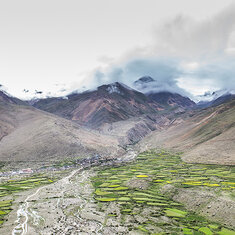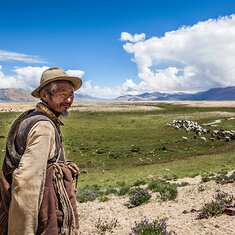Pagecontent
Rangeland management: transboundary landscapes
High-altitude rangelands play a crucial ecological role in the Hindu Kush Himalaya (HKH) region. They provide the headwater environment for major river systems and act as habitats for wildlife and plant species, many of which are endangered. As vast grazing lands for domestic animals they enable livelihoods for pastoralist communities. But while rangelands are becoming increasingly popular as tourist destinations, they continue to be home to millions of people who historically have been left behind due to their geographical remoteness.
CONCEPTUALIZING RANGELAND MANAGEMENT
The Austrian Development Agency supported the International Centre for Integrated Mountain Development (ICIMOD) from the early beginnings of its rangeland management work in 1995 through to the inception of the Rangeland Management Regional Programme in 1999. Currently, the institutional focus has widened into a Transboundary Landscapes Programme expanding across six landscapes of the HKH. This support has significantly improved the policy environment, capacity for co-management of rangeland resources and knowledge about rangelands' critical importance. The strong base of rangeland work with communities and policy-makers has enabled a clear focus of ICIMOD's continued work across national boundaries for biodiversity conservation and sustainable use of natural resources.
KNOWLEDGE WITHOUT BORDERS
A clear and central focus on mountain people and their livelihoods guided the programme's capacity enhancement for community members. This included the promotion of re-vegetation techniques, productive fodder species, livestock development options and value chains for mountain products. The launch of platforms for knowledge sharing among partners and policy-makers guided the approach to support pro-poor and people-centered rangeland management policies and laws across the region. ICIMOD provided support to the development processes for the first national rangeland policies in Bhutan, Nepal and Pakistan and to policy enhancement in China and India. It also supported Afghanistan in developing its rangeland law. These efforts strengthened the capacity to co-manage and implement new policies and laws among national, provincial and district level officials in all these countries.
RENEWABLE ENERGY AND ENERGY EFFICIENCY
As important as rangelands are to global ecosystems, they are fragile environments suffering from overall energy-deficiency. The lack of reliable and sustainable energy is a fundamental barrier to breaking the cycle of poverty. With ADA's support from 2006, ICIMOD focused on identifying and developing sustainable energy solutions for people living in rangeland areas across five HKH countries - Bhutan, China, India, Nepal and Pakistan. Based on the success of its initial efforts, ADA supported a second phase from 2009. Those projects identified, tested, and demonstrated new energy supply options and promoted low cost technologies. They enhanced the knowledge base on sustainable energy options for rangelands and demonstrated innovative financing solutions. This improved the capacity of partners, stakeholders and beneficiary communities in managing decentralized sustainable energy systems.
BROADENED IMPACT AS A CORE DONOR
From 1993, ADA has supported specific initiatives and programmes of ICIMOD, and thereby has impacted individuals, communities, institutions and governments across the HKH through visioning, implementing, researching, piloting, capacity enhancement and policy influence. From 2018, ADA broadened its impact by becoming a core donor supporting ICIMOD's three key strategic impact areas: reduced poverty, enhanced resilience through reducing physical and social vulnerabilities and enhanced ecosystem services.




